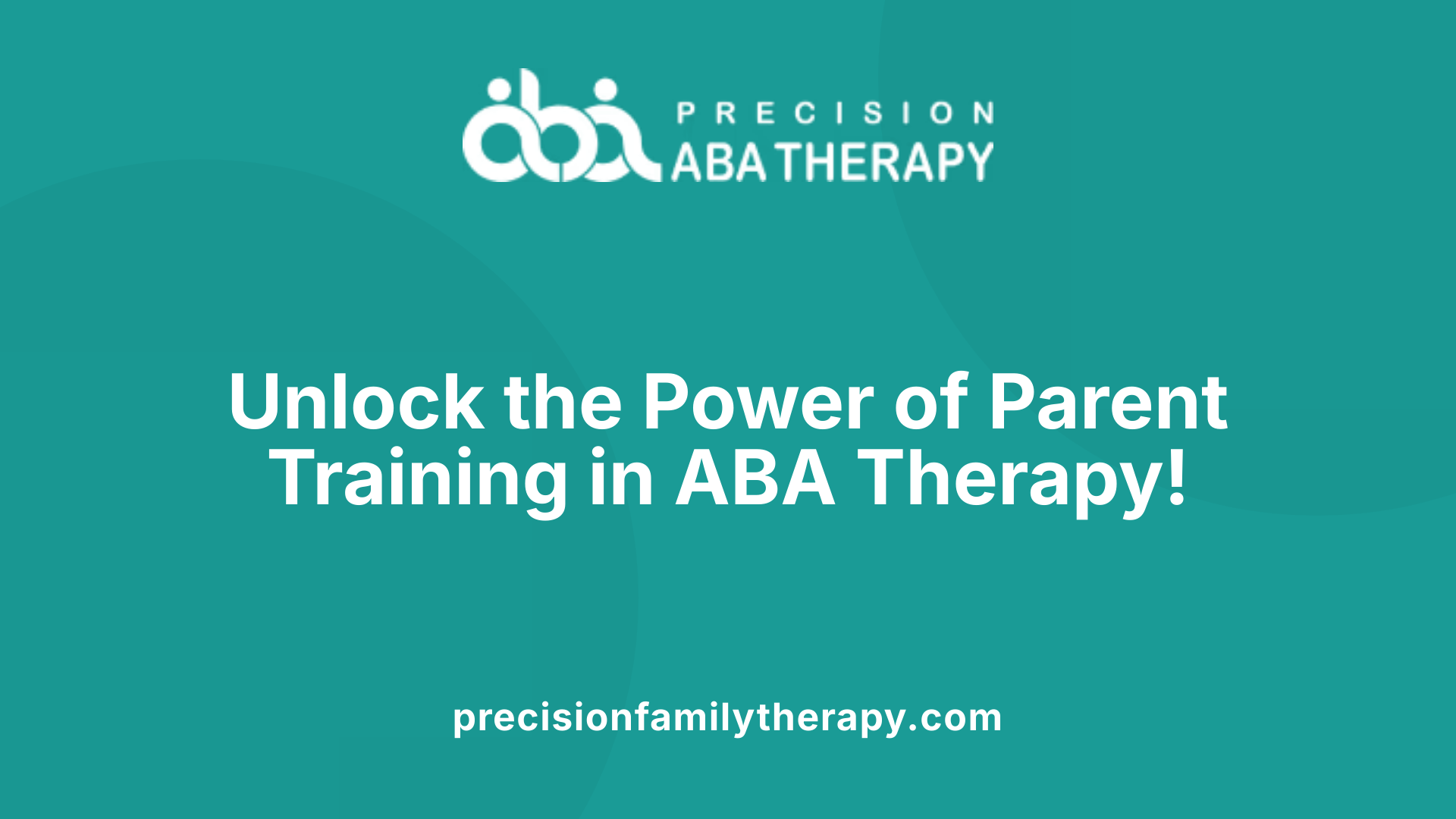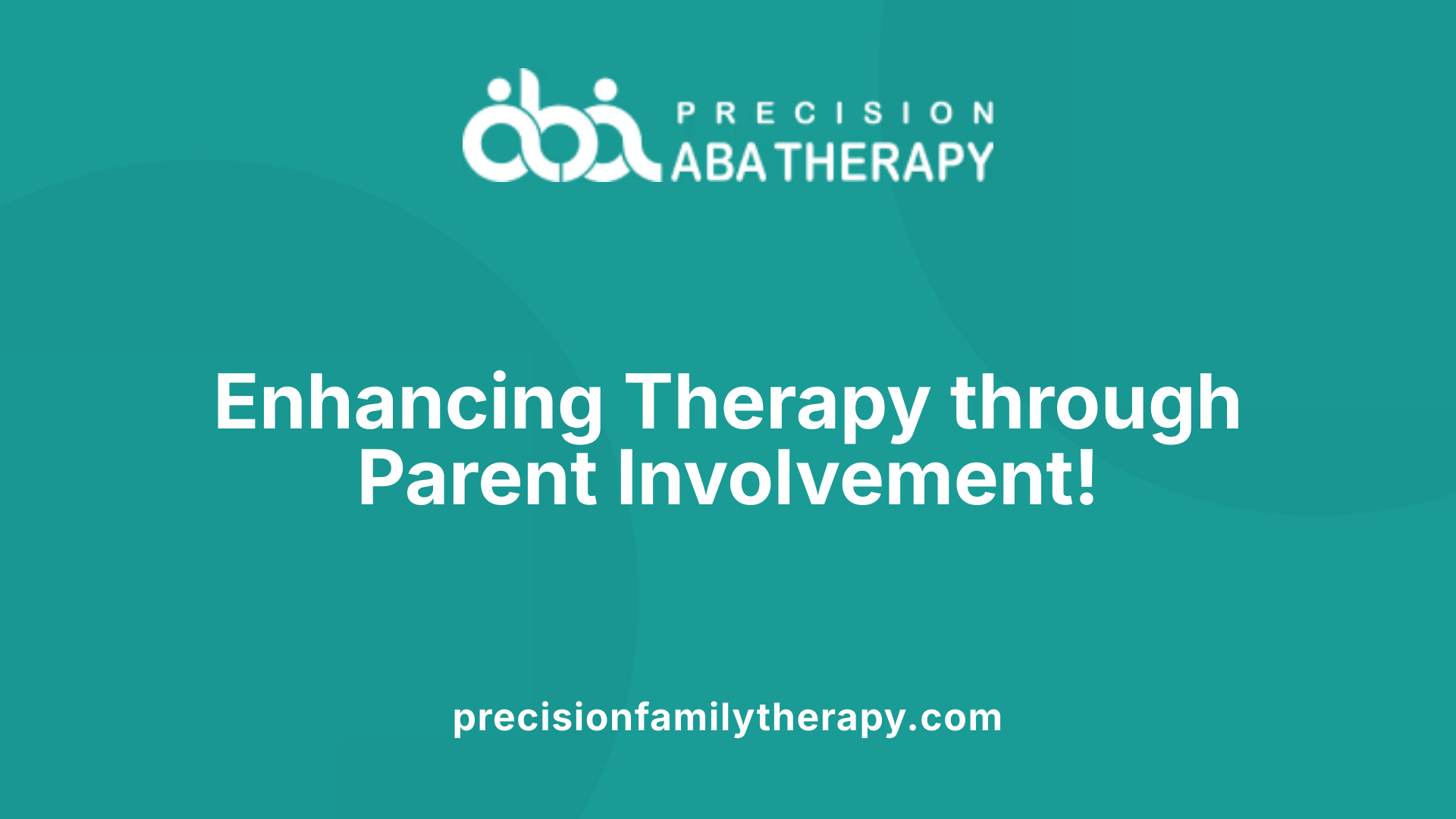Introduction to the Role of Parents in ABA Therapy
Applied Behavior Analysis (ABA) therapy has long been recognized as one of the most effective interventions for children with Autism Spectrum Disorder (ASD). However, the success of this therapy is significantly enhanced when parents play an active role in the process. This article explores why parent training is vital in at-home ABA therapy, how it contributes to better outcomes, and the practical strategies that can be employed to reinforce its principles in everyday settings. We'll also delve into the available resources that can empower parents to participate effectively and ensure long-term success for their children.
The Crucial Role of Parent Training in At-Home ABA Therapy

Why is parent training important in ABA therapy?
Parent training is crucial in ABA therapy because it empowers parents with the skills and knowledge they need to support their child's development effectively. When parents are actively involved in therapy, they can reinforce learning in everyday situations, leading to better outcomes for their children.
Training helps parents understand their child's goals, implement the Behavior Intervention Plan (BIP), and manage challenging behaviors consistently at home. Research, including findings from Gresham et al. (1999), shows that children whose parents are trained and engaged in their therapy experience greater progress than those without such involvement. Ultimately, collaboration between parents and therapists enhances the effectiveness of treatment and supports the child's growth in a holistic manner.
Empowering parents with knowledge and skills
Parent training equips parents with essential knowledge to apply behavioral strategies across various settings such as home, school, and community. This consistency is vital for the success of ABA therapy.
During training, parents learn practical techniques like positive reinforcement, prompting, and managing challenging behaviors. They receive coaching for real-life scenarios, allowing them to implement strategies effectively in daily routines. This understanding fosters greater parental confidence and enables them to create a supportive home environment that is conducive to learning.
Enhancing treatment outcomes through parent involvement
The involvement of parents significantly influences the effectiveness of ABA therapy. When parents are engaged, they not only practice and reinforce skills learned during therapy but also facilitate the generalization of these skills to everyday life.
Parent training sessions provide a platform for parents to share experiences, thus forming a collaborative network that enhances emotional support. Parents often report a sense of reduced stress and improved family dynamics, leading to a more harmonious living environment for their child.
In summary, active parental participation fosters a stronger parent-therapist collaboration, contributing to improved developmental outcomes for children with ASD.
The Impact of Parent Involvement on Therapy Effectiveness

How does parent involvement enhance the effectiveness of ABA therapy for children with autism?
Parent involvement enhances the effectiveness of ABA therapy by creating a supportive and integrated environment for children. Engaged parents apply the techniques learned in therapy during daily interactions, increasing the consistency and reinforcement of skills across varied settings. This consistent practice helps children generalize their skills, which is often a challenge in traditional therapy settings.
Programs like 'Jumpstarting to Independence' are designed to educate parents about specific goals and strategies. These programs empower parents to become facilitators of learning through structured activities and play, which also contribute to improving communication, social skills, and physical abilities.
Creating supportive environments for skill development
By participating actively in their child’s therapy, parents can create an environment that encourages skill development. The home becomes a practical learning space where techniques, such as positive reinforcement and behavior management, can be applied seamlessly.
Taking skills learned in sessions and embedding them in everyday life promotes a holistic approach. Parents learn to manage challenging behaviors and reinforce positive actions, which fosters a supportive atmosphere conducive to growth.
The holistic approach to integrating ABA principles at home
Ultimately, an integrated strategy that merges therapy with active parental involvement yields significant developmental benefits. Parents gain confidence through training, enabling them to quickly implement effective strategies in real-life scenarios, further supporting their child's progress.
Moreover, the collaboration between parents and therapists is strengthened through consistent communication, enhancing the overall efficacy of the therapy. This collaborative involvement not only accelerates skill acquisition but also nurtures family dynamics, leading to a harmonious home environment for children to thrive in.
Practical Strategies for Implementing ABA Therapy at Home

What are practical strategies for parents to implement ABA therapy at home?
Implementing ABA therapy at home is crucial for facilitating skill development and generalization. Practical strategies prioritize behavioral goals tailored to the unique needs of each child and family. Parents can foster a positive environment by effectively using behavioral reinforcement techniques, such as rewarding desired behaviors to encourage their children. This includes recognizing and identifying replacement behaviors that direct children toward appropriate actions.
How can role-playing and real-life practice enhance ABA techniques?
Engaging in role-playing during parent training sessions allows parents to practice ABA techniques in a controlled environment. This method enhances understanding, enabling them to apply these strategies more effectively when faced with real-life scenarios. Parents can simulate challenging situations and rehearse responses, boosting their confidence for when these situations arise.
Why is data collection and collaboration important for successful ABA implementation?
Simple methods for data collection should be integrated into daily routines to help parents track their child’s progress while minimizing stress. This data becomes invaluable when collaborating with professionals, ensuring that parents and therapists maintain consistent communication about the child’s development. An ongoing dialogue between parents and clinicians fosters a unified approach to applying ABA principles at home, enhancing the child’s learning experience and overall success.
| Strategy Type | Description | Benefits |
|---|---|---|
| Behavioral Goals | Tailored to each child’s unique needs and family dynamics | Focused growth and skill improvement |
| Positive Reinforcement | Rewarding desired behaviors and identifying replacements | Encourages appropriate actions |
| Role-Playing | Practicing techniques in training sessions | Builds confidence and skill application |
| Data Collection Methods | Simple tracking systems for progress monitoring | Informs strategies and reinforces learning |
| Collaboration with Therapists | Open communication and feedback with professionals | Consistency in therapy approaches |
Through these strategies, parents become active participants in their child's ABA therapy, further empowering them to support their child's development effectively.
The Benefits of Consistency and Early Intervention in ABA

Importance of consistent application of ABA techniques
Consistency in applying ABA techniques across home, school, and community settings is paramount for effective therapy. Parent training equips families with the skills and knowledge necessary to apply these strategies consistently. By reinforcing learned behaviors daily, parents can help solidify their child's understanding and generalization of new skills.
Early intervention's role in therapy success
Early intervention is critical in maximizing the effectiveness of ABA therapy. When parents are trained early on, they can implement strategies promptly, enhancing their child's ability to benefit from therapy. Research indicates that children who receive consistent and timely interventions show significant improvements, highlighting the importance of parental involvement from the outset.
Long-term benefits of parental involvement
Parental participation leads to accelerated skill acquisition and better long-term outcomes for children. Parents who actively engage in their child's ABA therapy often witness greater progress, fostering a collaborative relationship with therapists. This partnership not only empowers families but also enhances family dynamics and promotes a stable environment for the child’s continued development.
Educational Resources for Parents on ABA Therapy

What resources are available to educate parents on ABA therapy principles?
Several resources are available to help parents understand the principles of ABA therapy. One significant resource is the "ABA 101 Handouts," which offer extensive insights into Applied Behavior Analysis. These handouts define key terms, outline various techniques, and emphasize the importance of operational definitions for measuring behavior.
Additionally, they cover reinforcement strategies, such as positive and negative reinforcement, which play a critical role in behavior modification. This foundational knowledge equips parents to better engage with their child’s therapy.
How are parent training sessions structured and what benefits do they provide?
Parent training sessions are typically structured with clear lesson plans, allowing parents to learn effectively. These sessions can be conducted flexibly, including options for telepractice, ensuring accessibility. During training, parents gain valuable strategies tailored to their child's needs. This individualized approach enhances understanding and confidence while promoting consistency in applying ABA techniques at home.
How flexible are parent education programs?
Flexibility in delivering parent education programs is essential to meet the varying needs of families. By offering telepractice options and accommodating different schedules, parents can access training at their convenience. This flexibility not only increases participation rates but also ensures that parents can consistently apply the techniques learned, fostering a supportive and effective environment for their child's growth.
The Transformative Power of Parent Training
Parent training in at-home ABA therapy is transformative not just for the child, but for the entire family. By empowering parents with knowledge, confidence, and practical strategies, ABA therapy becomes more effective, facilitating notable developmental gains for children with ASD. As parents learn to reinforce, and generalize skills across various settings, consistent application becomes second nature. Support via group training or professional collaboration enhances this process, proving that the partnership between families and ABA therapists is key to achieving long-term success. With the right resources and commitment to the therapy process, families can celebrate meaningful progress in their child’s journey.
References
- The Importance of Parent Training in ABA Therapy: Empowering ...
- 4 Ways Your Child Benefits From Parent Training In ABA Therapy
- Parent Training in ABA: How Caregivers Can Support - ZABA Therapy
- What are the benefits of in-home ABA therapy? | Autism Resources
- The Importance of Parent Training in ABA Therapy | Childwise
- 4 Ways Your Child Benefits From Parent Training In ABA Therapy
- Parent Collaboration - Autism Learning Partners
- A creative solution to improve equity in Applied Behavior Analysis ...
- How is Exercise Used in ABA Therapy?




